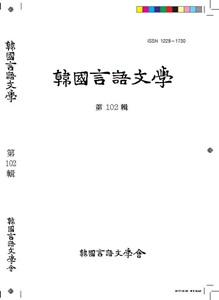학술논문
나도향 소설과 낭만적 자아의 윤리
이용수 338
- 영문명
- Romantic Sensibility of Na Do-hyang s Novels
- 발행기관
- 한국언어문학회
- 저자명
- 서은혜(Seo Eun hye)
- 간행물 정보
- 『한국언어문학』韓國言語文學 第103輯, 265~304쪽, 전체 40쪽
- 주제분류
- 어문학 > 한국어와문학
- 파일형태
- 발행일자
- 2017.12.30
7,600원
구매일시로부터 72시간 이내에 다운로드 가능합니다.
이 학술논문 정보는 (주)교보문고와 각 발행기관 사이에 저작물 이용 계약이 체결된 것으로, 교보문고를 통해 제공되고 있습니다.

국문 초록
영문 초록
In several reports, the romanticism of the Na Do-hyang s novels were understood to mean the same as sentimentalism or longing , and it was mainly criticized as an indication of lack of realism. There are two main reasons for the negative connotation of the romanticism in those reports. First, They consider the characteristics of Na s novels are considerably similar to those of literary coterie magazine Swan , which Na Do-hyang belongs. Second, They want to establish literary continuity from Swan to the Anti-conventional literature. They want to explain sentimentalism which is mentioned as the feature of the former is transferred realism, which is considered as that of the latter. However, researchers begin to consider the romanticism in 1920s not as a historical art trend, but as a problem of sensibility lately. In addition to this, the contents and implications of romantic sensibility of Na’s Do-hyang novel is not limited to the talking about the Swan literary character, but it is necessary to be narrated inductively through analyzing his various works. This report focus on the ethical sensibility of Na Do-hyang s characters. In western romanticism, nature was considered as the representation of eternity and sacred. It was the result of resistance against the mechanicalistic view ofthe world. But in Chosen literary field in 1920s, the representation of eternity was much more cultural, such as love, art, trust. These concepts were imported by western society in that period. And Na wants to demonstrate the characters who support eternal values such as love and art faithfully. They face many obstacles such as the logic of capitalism in newly modernized Chosen, but they also overcome through fidelity to their own belief. Death is the result of that kind of attitude. This kind of fidelity, which Na s characters show, is grounded of the argument of Nietzsche. Na Do-hyang agree the morality of the strong ( übermensch in Nietzsche s context) of Nietzsche. We can find it from the several mentions of characters. The strong person, same as übermensch in Nietzsche s context, judge the whole events by his own ethical opinion. He does not follow social morality unconditionally. In conclusion, the romantic sensibility of Na Do-hyang s characters are newly summed up three points. First, the tendency of following the value of eternity, such as love, art, and trust. Second, we can find a ethical fidelity to the eternal value in diverse works. They sometimes choose to die for defending their belief. Third, they consider the value of spontaneous judgement in moral dilemma importantly. This results help us to distinct characteristics of Na s own romantic sensibility from those of other Swan members.
목차
1. 서론
2. 낭만적자아의존재(행위) 조건: 영원성과 절대성
3. 니체의 강자(强者)와윤리 판단의자발성
4. 죽음을통한삶의의미완성과현실너머의 진리 체현
5. 마무리
<참고문헌>
키워드
해당간행물 수록 논문
- 언간 규식서의 투식적 표현과 한글 편지에의 실현 양상 연구
- 서사문학의 익명성과 개성화에 대한 일고찰
- <해녀노젓는소리> 사설에 나타난 지명 의미와 민속 지식
- 문예지 지평선과 신대륙의 문학사적 의미
- 죽도주인전(竹島舟人傳) 연구
- 현대 서사 문화 속의 제주 해녀
- 조선 후기 영남지역 가사에 나타난 道統구현 양상과 그 의미
- 공기어를 통해 본 방송사의 포지션(position)에 대한 연구
- 학문 목적 유학생의 글쓰기 교육과 교재에 대한 일 고찰
- 『松窩雜說』의 필기문학상 위상에 대하여
- 해녀 도구어의 낱말밭 연구
- 유치환 시에 나타난 ‘페르조나’와 ‘자기’의 발현 양상
- 나도향 소설과 낭만적 자아의 윤리
참고문헌
관련논문
어문학 > 한국어와문학분야 BEST
- 국어의 줄임말 현상에 따른 언어변이 양상과 문제점
- ‘밈(meme)’을 활용한 고전문학과 문화콘텐츠의 상호 협력과 융복합교육
- 연구 동향 분석을 통해 본 학문 목적 한국어교육 연구의 실태와 제언
최근 이용한 논문
교보eBook 첫 방문을 환영 합니다!

신규가입 혜택 지급이 완료 되었습니다.
바로 사용 가능한 교보e캐시 1,000원 (유효기간 7일)
지금 바로 교보eBook의 다양한 콘텐츠를 이용해 보세요!






